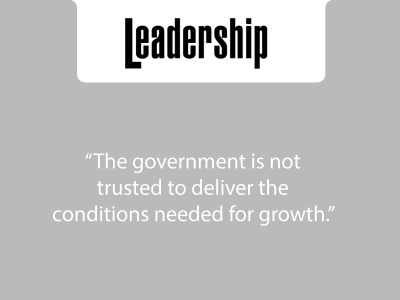South Africa has dug a very deep hole for itself

Ann Bernstein takes a look at the current situation in South Africa in terms of growth and what she calls the government’s ‘antigrowth strategy’.
Trust, they say, is earned. It’s an expression that conveys both that trust is a valuable commodity, and that it is not conferred willy nilly. If someone wants to be trusted, they must be willing to make an effort, to incur a cost, to invest energy and resources in actions that demonstrate their trustworthiness. If they do, and if they are trusted, then benefits accrue: a trusted party can expect more cooperation from others, that they will have to invest less time and energy in finding willing partners, and that, when they do, those partners might not require that they jump through every conceivable due diligence hoop.
It is worth thinking about the value of trust, and the necessity of its being earned, and using this as a prism through which to think about the relationship between South Africa’s government and the businesses and entrepreneurs whose decisions define the trajectory of the economy.
Do businesses trust the government enough to invest resources in projects with long payoff periods? Do they believe that policy makers are willing to invest political capital in ensuring that the business environment improves? Or do they think that officials-elected and appointed-will fail to deliver those conditions or will do so but only in return for under-the-table payments?
The prism of trust and trustworthiness is also useful for thinking about the relationship between the government and the individuals and households who pay taxes and who buy services from state owned companies.
Do individual and corporate taxpayers believe that the government grasps that when taxes are raised, returns on investment fall, and that when returns on investment fall, so too does investment? Do they believe that the government respects the resources entrusted to it, and that it seeks to use those resources as efficiently as possible, and in the best interest of the population or of economic growth? Or do they worry that the government sees taxpayers as a farmer in distress might see his herd: a resource to be exploited as he wards off his creditors?
Sadly, in South Africa in 2023, these questions answer themselves. The government is not trusted to deliver the conditions needed for growth. As a result, those whose actions will determine the pace of growth-households, businesses, entrepreneurs, and investors-have become exceptionally risk averse, investing less and less time, energy, and resources in future oriented actions, and doing more and more to minimise exposure to South Africa specific risks and to protect their assets.
Evidence for this is abundant: investment rates are a fraction of what they need to be for an economy to grow; more and more money is invested outside of South Africa, foreigners are net sellers of South African assets by large margins; emigration of skilled South Africans and their children, appears to be accelerating.
There is no secret about the reasons why the government’s stewardship of the country is so mistrusted. It is the consequence of the triumph of experience over hope. It has become increasingly obvious over the past decade and a half that the South African state and the policy makers who lead it neither appreciate nor really care what businesses need in order to succeed. Poor policy, worse government performance, and an extraordinary lack of leadership have businesses increasingly reluctant to make the kind of long-term commitment that is needed if growth is to accelerate and to be sustained.
The most obvious example of an experience from which both business and ordinary South Africans have learnt to mistrust the government is the ‘lost decade’ of state capture, closely associated with the misrule of Jacob Zuma and his government.
But any honest appraisal of the post-Zuma years must conclude that there has been much less improvement in the quality of governance than supporters of President Cyril Ramaphosa had promised or hoped for. The jury is still out as to whether the quantum of corruption across all spheres of the government in 2023 is very much less than that of 2017.
Add to this the singular failure to hold criminally accountable anyone associated with the grand corruption of the Zuma years, and it is entirely reasonable for observers to conclude that the risks of a reversion to state capture is a depressingly plausible outcome of the existing political malaise.
Bad governance is also evident in critical domains. Eskom, for example, must be one of the most catastrophic examples of misgovernance in the history of state-owned businesses. Surely there can never before have been an institution so critical to the welfare of a society and its economic prospects whose performance has been allowed to decay so much outside of war zones and revolutions? Venezuela’s oil industry might be the only comparable example.
Transnet is not much better: it has fewer freight trains and they are also less reliable, its ports are rated as among the worst performing in the world, and the only reason it posted a profit last year was a substantial revaluation of some of the assets owned by one of its divisions.
Eskom and Transnet demonstrate the bankruptcy of two of the ruling party’s core ideas: state ownership of network industries that command monopolies over key services, and cadre deployment. Neither one of these ideas survives any real contact with the evidence for what drives growth or what is good for South Africa, and together the malign effect of each reinforces and expands that of the other. The totality of the damage done far exceeds the sum of its parts.
The decay of the infrastructure owned by Eskom and Transnet is one of the clearest consequences of the misgovernance of these two critical businesses.
Local government is a key provider of infrastructure critical to service delivery, to the quality of life and to the cost of doing business. The quality of local roads, water provision, power distribution, and solid waste management all depend on the quality of the local government. The evidence from the auditor general is, sadly, that most local governments are collapsing.
The government is failing in its most basic functions maintaining security, preventing and investigating crime, upholding the rule of law. Levels of violent crime, among the highest in the world, are rising, while a top-heavy police service appears to be less and less interested in doing its job. Nor is it only “ordinary” crime that the police are failing to address: the events of July 2021, which the state was helpless to deal with as it happened, suggests both how fragile our society is and how incapable the state is to prevent the very worst from happening. The fact that no ringleaders have been prosecuted for what the president called at the time an “insurrection” reinforces the extent of state incapacity.
There are other areas in which bad policy and poor governance have undermined faith in the government’s commitment to, and ability to deliver, growth. Consider, the way in which economic policy makers have failed to grasp that, however much favoured groups might benefit from policies like BBBEE and localisation, the net effect of these policies must be to raise the cost of doing business and undermine growth for all.
Consider, Andre de Ruyter’s claim in his tell-all memoir that the costs of a kilometre of transmission lines in South Africa is two-and-a-half times greater than it is in Namibia. Without having seen the evidence that Mr de Ruyter relies on in making this claim, one cannot evaluate the extent to which a 150% localisation premium exists. But even if it is only half of that, such costs bake higher electricity prices into the economy, reducing economic efficiency for all businesses even as steel producers laugh all the way to the bank.
It has also become evident in recent years that the policy that 30% of all large construction contracts must be allocated to local businesses has metastasised into a justification for extortion, first in construction and, increasingly, in other spheres of economic activity.
Poor policy choices are evident also in our macroeconomic policies, where the government makes an annual, ritualised commitment to controlling expenditure sufficiently to stabilise the debt ratio, only for subsequent decisions to undermine that “commitment”. For example, agreeing to higher-than-budgeted salary increases for public servants or providing bailouts to state-owned companies whose needs were obvious and ought to have been budgeted for. The result? Higher levels of borrowing and more debt; higher interest rates and less investment.
Meanwhile, repeated promises for structural reforms are made, only to be broken. Visa reform, skilled migration reform, the expansion of the infrastructure project pipeline, private participation in Transnet’s activities, PPP reform, digital migration: the list of reforms promised but not delivered is long.
If only it was the failure to deliver positive structural reforms, though! Not only does the government promise but fail to deliver positive reforms, it is actively working on policies that will slow growth further. Expropriation without compensation, a universal basic income grant, NHI wealth taxes: the list of costly or misguided policies to which the government will lend serious attention is as impressive as it is depressing.
It is little wonder, in the face of everything mentioned here, that confidence in the future has collapsed, and with it, a willingness of firms, entrepreneurs, and households to commit resources to risky ventures. To do so requires a conviction that the future will be better than the present, because then it is easier to imagine how an investment today will pay off over time. Poor policy and bad governance have repeatedly undermined any confidence one might have in the future.
Making matters worse, mistrust in the government has been well and truly earned and is now deeply ingrained. In these circumstances, the government won’t get full credit for anything positive that it manages to do-and it will not see as positive a response in investment rates as it might expect-until trust has been regained. This will be frustrating for policy makers who might do the right thing, but the government has no one to blame but itself for this.
Good, decisive leadership might help the government regain trust. But leadership, too, is something the state lacks. Indeed, indecisive, uncertain, and contradictory leadership has deepened the crisis that South Africa faces. How, business leaders and entrepreneurs must wonder, can we expect to make progress when no-one seems to be in charge, no-one is making decisions, and no-one is holding to account ministers and senior public servants who can’t or won’t do their jobs?
South Africa has dug a very deep hole for itself. The first rule of getting out of such a hole, of course, is to stop digging.
Unfortunately, that hasn’t happened yet. Until it does, and notwithstanding anything the president might say, we will continue to implement what is, de facto, an antigrowth strategy.
This article is based on a new Centre for Development and Enterprise CDE report, `SA’s antigrowth strategy: How poor policy and bad governance are wrecking growth’
Ann Bernstein is the executive director of the Centre for Development and Enterprise.
Article published by Leadership Magazine







